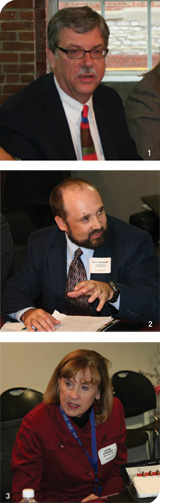
Dave Geenens agreed. In addition to critical-thinking skills, “which are important, especially as students elevate their careers,” Geenens saw the need for students to master “state-of-the-art technology so they can actually do something when they graduate and add value to their enterprise.”
Myles Gartland shared one problem common on all campuses when it comes to upgrading technology. “Our stakeholders are interested in it. Our deans are interested in it,” he noted, but the “difficult piece” is getting faculty not only to learn the technology, but also to use it in their pedagogy. “I find this the biggest challenge,” said Gartland, “not buying the latest and greatest piece of hardware.”
As something of a counterpoint, Doug Dunham worried that schools sometimes focus overly on teaching students how to solve a particular problem at the expense of teaching broader problem-solving skills. “If we’ve done our job well and given students the foundational skills, they’re going to be able to adapt to whatever job comes up in the future.”
Defending Free Enterprise
Often, business schools operate in campus environments that are not appreciative of, and often downright hostile to, the American free-enterprise system. The question was raised as to how administrators manage this potential divide.
Steve Wiegenstein argued that entertaining such debates is what universities are all about. They were created to be the place “where ideas collide.”
“Ultimately, the truth is found in the idea,” said Dave Geenens. He rejects the notion that there is no objective truth. Part of the role of the Catholic University, as he sees it, is to evaluate ideas, like Marxism or socialism, and see how they work in the real world. “We try to connect the dots that way for our students,” said Geneen. “You choose: government intervention or internally formed temperance. It’s your choice.”
Teng-Kee Tan likewise sees the university as a “place for people to talk about ideas.” The more students are exposed to the world the more useful they can be in shaping it. “Students see that it is the entrepreneurial spirit of the individual that thrives,” he said. “They come back and reaffirm that we have a good system. What we need to do is build upon a system to solve some of these problems.”
In his own classes at UCM, Skip Crooker explores the world of ideas with his students. They are encouraged to look critically at the system, its successes and its shortcomings. “What I share with them is that certainly capitalism gives people with ideas the opportunity to act on that idea.”
Kay Henry would like to see MBA programs “nurture that right brain a little more” and give students more grounding in the world beyond bottom line considerations.
“Even though I know we’re talking about graduate education,” said Doug Dunham, “I have to go back and say the foundational skills and knowledge we teach in a liberal arts education are what the graduate then can build on.”
Return to Ingram's September 2011